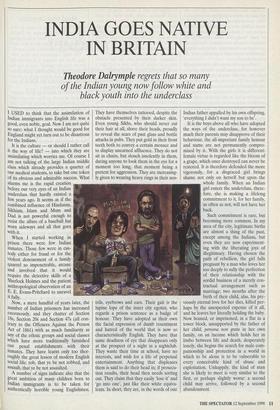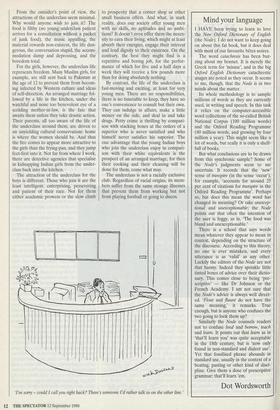INDIA GOES NATIVE IN BRITAIN
Theodore Dalrymple regrets that so many of the Indian young now follow white and black youth into the underclass I USED to think that the assimilation of Indian immigrants into English life was a good, even noble, goal. Now I am not quite SO sure: what I thought would be good for England might yet turn out to be disastrous for the Indians.
When I started working in prison there were few Indian inmates. Those few were in cus- tody either for fraud or for the violent denouement of a family quarrel so impenetrable, arcane and involved that it would require the detective skills of a Sherlock Holmes and the patient anthropological observation of an E. E. Evans-Pritchard to unravel it fully.
Now, a mere handful of years later, the number of Indian prisoners has increased enormously, and they chatter of Section 18s, Section 20s and Section 47s (all con- trary to the Offences Against the Person Act of 1861) with as much familiarity as any of the ethnic groups and social classes Which have more traditionally furnished our penal establishments with their inmates. They have learnt only too thor- oughly the great lesson of modern English social life: rob, that ye be not robbed, and assault, that ye be not assaulted.
A number of signs indicate also that the great ambition of many children born to Indian immigrants is to be taken for authentically horrible young Englishmen. They have themselves tattooed, despite the obstacle presented by their darker skin. Even young Sikhs, who should never cut their hair at all, shave their heads, proudly to reveal the scars of past glass and bottle attacks in pubs. They put gold in their front teeth both to convey a certain menace and to display unearned affluence. They do not sit in chairs, but slouch insolently in them, daring anyone to look them in the eye for a moment too long, that moment being a pretext for aggression. They are increasing- ly given to wearing heavy rings in their nos- trils, eyebrows and ears. Their gait is the lupine lope of the inner city egotist, who regards a prison sentence as a badge of honour. They have adopted as their own the facial expression of dumb resentment and hatred of the world that is now so characteristically English. They have that same deadness of eye that disappears only at the prospect of a night in a nightclub. They waste their time at school, have no interests, and wish for a life of perpetual entertainment. Anything that displeases them is said to do their head in; if prosecu- tion results, their head then needs sorting out. They claim that they easily 'lose it' and 'go into one', just like their white equiva- lents. In short, they are, in the words of one Indian father appalled by his own offspring, 'everything I didn't want my son to be'.
It is the boys above all who have adopted the ways of the underclass, for however much their parents may disapprove of their behaviour, the all-important family honour and name are not permanently compro- mised by it. With the girls it is different: female virtue is regarded like the bloom of a grape, which once destroyed can never be restored. It is therefore defended the more vigorously, for a disgraced girl brings shame not only on herself but upon the whole family. When an Indian girl enters the underclass, there- fore, she is making a lifelong commitment to it, for her family, as often as not, will not have her back.
Such commitment is rare, but becoming more common. In my area of the city, legitimate births are almost a thing of the past, except among the Indians, but even they are now experiment- ing with the liberating joys of illegitimacy. Having chosen the path of rebellion, the girl falls pregnant by a man who loves her too deeply to sully the perfection of their relationship with the sordid business of a merely con- tractual arrangement such as marriage; two months after the birth of their child, alas, his pre- viously eternal love for her dies, killed per- haps by the unexpected expense of it all, and he leaves her literally holding the baby. Now housed, or imprisoned, in a flat in a tower block, unsupported by the father of her child, persona non grata in her own family, on an income which holds her in limbo between life and death, desperately lonely, she begins the search for male com- panionship and protection in a world in which to be alone is to be vulnerable to every conceivable kind of abuse and exploitation. Unhappily, the kind of man she is likely to meet is very similar to the first, or perhaps slightly worse: a second child may arrive, followed by a second abandonment. From the outsider's point of view, the attractions of the underclass seem minimal. Why would anyone wish to join it? The food is filthy (no young underclass patient arrives for a consultation without a packet of junk food), the music appalling, the material rewards non-existent, the life dan- gerous, the conversation stupid, the accom- modation damp and depressing, and the boredom total.
For the girls, however, the underclass life represents freedom. Many Muslim girls, for example, are still sent back to Pakistan at the age of 12 to prevent them from becom- ing infected by Western culture and ideas of self-direction. An arranged marriage fol- lowed by a life in the kitchen, under the watchful and none too benevolent eye of a scolding mother-in-law, is the fate that awaits them unless they take drastic action. Their parents, all too aware of the life of the underclass around them, are driven to an unyielding cultural conservatism: home is where the women should be. And thus the fire comes to appear more attractive to the girls than the frying-pan, and they jump feet-first into it. Not far from where I work, there are detective agencies that specialise in kidnapping Indian girls from the under- class back into the kitchen.
The attraction of the underclass for the boys is different. Those who join it are the least intelligent, enterprising, persevering and patient of their race. Not for them either academic prowess or the slow climb to prosperity that a corner shop or other small business offers. And what, in stark reality, does our society offer young men with no skills, no aptitudes and no ambi- tions? It doesn't even offer them the neces- sity to earn their living, which might at least absorb their energies, engage their interest and lend dignity to their existence. On the contrary, the best they might find is a repetitive and boring job, for the perfor- mance of which for five and a half days a week they will receive a few pounds more than for doing absolutely nothing.
By contrast, the life of the underclass is fast-moving and exciting, at least for very young men. There are no responsibilities, there is no timetable to keep, they have no one's convenience to consult but their own. They can indulge in affairs, make a little money on the side, and deal in and take drugs. Petty crime is thrilling by compari- son with stacking boxes at the orders of a superior who is never satisfied and who himself never satisfies his superior. The one advantage that the young Indian boys who join the underclass enjoy in compari- son with their white equivalents is the prospect of an arranged marriage, for then their cooking and their cleaning will be done for them, come what may.
The underclass is not a racially exclusive club. Regardless of racial origins, its mem- bers suffer from the same strange illnesses that prevent them from working but not from playing football or going to discos.
sorry - could I call you right back? There's someone I'd rather talk to on the other line.'



































































 Previous page
Previous page